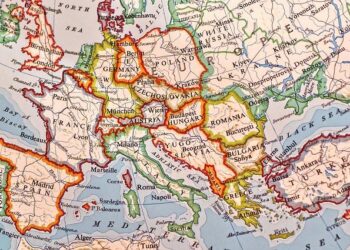Enhancing Economic Collaboration: Switzerland, Iceland, Liechtenstein, Norway, and Ukraine
In a meaningful move to bolster economic cooperation and trade prospects, Switzerland, Iceland, Liechtenstein, and Norway have officially revised their free trade agreement with Ukraine. This updated accord underscores the commitment of these European nations to assist Ukraine amid its ongoing challenges. The agreement is crafted to enhance market access and foster collaboration across various sectors. It marks a pivotal step in integrating Ukraine into the European economic framework and is expected to stimulate growth while attracting investment in the region. As global dynamics evolve rapidly, this partnership emphasizes the importance of international alliances in promoting resilience and prosperity.
Core Components of the Revised Free Trade Agreement
The recent signing of this updated free trade agreement signifies a vital evolution in the economic ties between Switzerland, Iceland, Liechtenstein, Norway, and Ukraine. The revised treaty aims to fortify trade relations while establishing a robust framework for mutual development. Key aspects of this agreement include:
- Reduction of Tariffs: Lowering tariffs will promote increased exports and imports among participating nations.
- Easier Market Access: Opening new pathways for businesses to expand their presence within each market.
- Investment Safeguards: Strengthening legal frameworks that ensure safer investments for companies engaged in cross-border transactions.
This extensive approach seeks to invigorate economic advancement particularly following recent global disruptions. Furthermore, both parties recognize the importance of sustainable practices by advocating environmentally responsible trading policies. The agreement also highlights collaboration across several key sectors such as:
| Sectors Involved | Pursuable Opportunities |
|---|---|
| Technology Sector | Create partnerships focused on innovation initiatives. |
Advantages of Strengthened Trade Relations for Ukraine’s Economic Development and European Integration
The establishment of an updated free trade agreement between Switzerland, Iceland, Liechtenstein, Norway, and Ukraine represents a significant milestone for Ukraine’s economic aspirations. This pact is set to expand market access for Ukrainian products while promoting increased exports across diverse industries such as agriculture, textiles, and technology.The primary benefits arising from these enhanced trading relations include:
- Diverse Export Opportunities:The ability for Ukrainian goods to penetrate strong markets may lead to GDP growth.
- Create New Employment Opportunities:An uptick in export activities is likely to generate new jobs that further stimulate economic progress.
- Tapping into Technological Innovations:This strengthened relationship can facilitate knowledge exchange along with access to advanced technologies.
This free trade arrangement also serves as a catalyst propelling Ukraine’s efforts toward deeper integration with Europe by aligning its trading standards with those prevalent among EU partners—bringing it closer within the EU’s broader economic structure. The implications extend beyond immediate commercial advantages; they elevate Ukraine’s status on an international scale while supporting long-term stability goals.
The overall impacts on both growth trajectories may encompass:
- Attracting Foreign Investments: Enhanced trading relationships can draw foreign capital necessary for infrastructure advancements.< /LI >
- Building Economic Resilience: A diverse array of trading partnerships can definitely help shield against external shocks impacting economies.< /LI >
- Conformance With European Standards: Adhering closely with EU norms simplifies future negotiations regarding membership or agreements.< /LI >
Strategies To Maximize Benefits From The Free Trade Agreement For Ukraine   ​ ​ ​ ​  ​ ​ ​ ​ ​ ​  ​​​​  ​​​​  ​​​​  ​​​​  ​​​​  ​​​​                                                                                                          
To fully capitalize on advantages from this newly established free trade accord involving Switzerland,Iceland,Liechtenstein,and Norway ,Ukraine should consider implementing strategic initiatives .
< Strongly Improving Quality Standards :  ;This step will enable Ukrainian exports meet rigorous demands set forth by these markets .Investments directed towards < STRONG > ;technology upgrades </ STRONG > ;and training programs tailored specifically towards local industries could greatly assist advancement efforts .Additionally ,< STRONGLY > ; bolstering supply chain logistics</ STRONGLY>  ;is crucial ensuring timely delivery meeting consumer expectations effectively .Collaborating closely alongside relevant associations amplifies visibility surrounding Ukrainian products abroad .
Furthermore ,actively engaging through targeted promotional campaigns geared towards specific markets enhances potential benefits derived from said agreements.
Organizing events like exhibitions showcasing unique offerings fosters direct connections between exporters buyers alike .Developing marketing strategies emphasizing sustainability innovation resonates well consumers increasingly valuing such attributes today establishing feedback loops importers consumers critical continuous advancement adapting preferences accordingly .
In conclusion ,the renewed free-trade deal forged amongst Switzerland,Iceland,Lichtenstein,Norway,andUkraine represents meaningful progress toward fortifying bilateral ties promoting shared prosperity moving forward.The commitment displayed amidst geopolitical uncertainties reflects collaborative spirit aiming streamline processes benefiting all stakeholders involved.As nations pursue collective vision centered around resilience stability implications arising outofthis partnership extend far beyond mere commerce fostering diplomatic rapport paving pathways future cooperation spanning diverse fields.Stakeholders analysts alike shall keenly observe developments unfolding over ensuing months underscoring importance international collaborations our interconnected world today.















